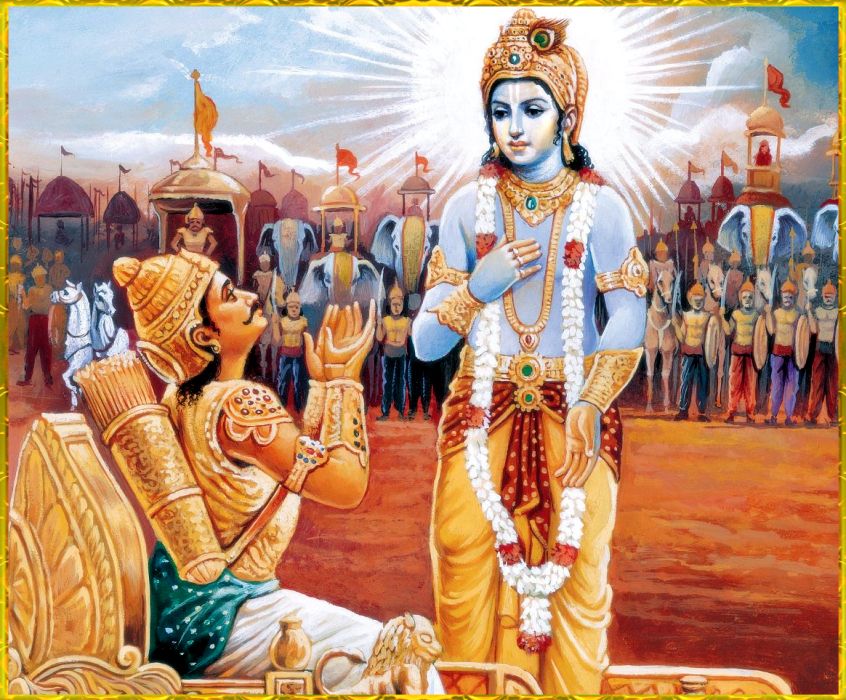Dharma is a very complex and multifaceted concept in Indian religions, including Hinduism, Buddhism, Jainism, and Sikhism. It generally refers to a set of moral and ethical duties, responsibilities, or laws that govern an individual’s behaviour and contribute to the harmony of society.
In Hinduism, dharma can also be defined as the specific duties of individuals according to their age, caste, and stage of life. There are several lessons by Krishna about Dharma in the Kurukshetra war. It includes righteousness, justice, and the right way of living.

In Buddhism, dharma refers to the teachings of the Buddha, which describe the path to enlightenment and moral conduct.
In a nutshell, dharma emphasizes living a virtuous life with responsibility. It is the guiding principle for making decisions about one’s moral and spiritual lives.
Lessons by Krishna about Dharma
Dharma is a concept that takes an important place in Indian philosophy, especially in Hinduism. Much of the discussion about dharma is centred on Krishna, a divine figure whose teachings offer great insight into the moral and ethical framework of life. Being one of the central characters of the ancient Indian epic Mahabharata, as well as in Bhagavad Gita, the lessons that Krishna teaches about dharma shed light on how complex duty, righteousness, and the path to fulfilment of the spirit is.
Understanding Dharma
Dharma can be understood broadly as the moral law that governs individual conduct and social order. Dharma is a guide for ethical behavior and decision-making. Dharma is to be on the right path even in the hardest times.
Krishna’s teachings clarify that dharma is not a rigid principle but a dynamic rule based on the context it finds itself in. His teaching, shows that it is for maintaining personal integrity and order within society.
The Context of Krishna’s Teachings in the Bhagavad Gita
The Bhagavad Gita is a scenario of a great war between two factions of a royal family, the Pandavas and the Kauravas. Arjuna, one of the Pandavas and a warrior prince, is filled with doubt and moral confusion about fighting in the war. It is in this moment of crisis that Krishna serves as his charioteer and imparts profound wisdom about dharma. The lessons by Krishna about Dharma are:
The Principle of Duty (Svadharma)
Lessons by Krishna about Dharma teaches one of his first lessons to Arjuna: the principle of svadharma—every person’s duty.
He urges Arjuna to accept his profession as a warrior and carry on his duty without being interested in the fruits of that particular work. Krishna asserts to Arjuna that not only is he serving dharma by doing so, but he is also aiding society. This thought aligns with the view that all individuals should play a distinct role, and the lack of playing the role creates chaos.
Lesson by Krishna about Dharma: Selflessness and Detachment
Krishna teaches Arjuna regarding the role of acting non-egoistically and disinterestedness in the outcomes of his actions. The teacher also preaches him “karma yoga”-the science of action based on disinterestedness. This teaching tells us that in spite of one’s interest in completing their duties properly, a man should not be unduly interested in the consequences. Such detachment in acting with non-possessiveness allows individuals to act virtuously without bondage to their desires.
The Nature of Life and Death
In an attempt to assuage Arjuna’s fears about killing his kinsmen and teachers, Krishna shares the concept of an eternal soul.
He further states that a soul cannot be killed and hence is not born, so death cannot be regarded as killing. This kind of reasoning will free Arjuna from his dilemma of conscience and enable him to look beyond immediate attachments toward a greater vision. Krishna’s lesson here is profound: acting according to one’s dharma might entail difficult choices, but those choices are part of a greater cosmic order.
Krishna also stresses that fighting a righteous war, Dharma Yuddha, is a noble pursuit if it is for a just cause. He says that one should oppose injustice and support dharma, which, at times, involves resisting evil. This is a great lesson for all of us in contemporary talk on social justice and responsibility.
Divine Guidance
As a charioteer, Krishna signifies the need to look up to the gods to be led towards dharma. As Arjuna places his trust in Krishna, he learns the value of surrendering to a power higher than oneself. Faith and surrender become significant factors in meeting the demands of life while remaining on track with the demands of duty.
Balance of Action and Spirituality
Krishna about Dharma has always described the importance of spiritual growth. He teaches that dharma is not only the performance of duties in the external world but also for the spiritual development of a person.![]()
Dharma cultivates important virtues such as compassion, humility, and devotion and hence boosts the spiritual growth of a person. This balance between action and spirituality is crucial for living a fulfilling and meaningful life.
The Contemporary Relevance of Krishna’s Lessons
Lessons by Krishna about Dharma are not merely historical or religious principles but are very relevant to modern times. Today, people face a multitude of ethical dilemmas and challenges that require them to navigate their personal duties with integrity in a complex world.
Krishna’s teachings help people find peace and resilience in the face of life’s uncertainties by encouraging them to act without the burden of attachment.
Spiritual Growth
Lessons by Krishna about Dharma reminds us that dharma includes inner development, and so spiritual practices must accompany daily life. In this way, holistic well-being can guide individuals along their journeys toward self-discovery and fulfilment.
Pandavas and Dharma
The Pandavas, central figures in the Indian epic Mahabharata, are a complex representation of dharma, or righteousness. The five brothers—Yudhishthira, Bhima, Arjuna, Nakula, and Sahadeva—embody various facets of dharma, showing how moral and ethical principles navigate the tumultuous human experience.
Yudhishthira, the eldest, personifies truthfulness and integrity. His commitment to the lessons by Krishna about Dharma often puts him in a difficult position, particularly when faced with the schemes of his cousin Duryodhana, who is full of deceit. He is the epitome of the idea that dharma does not necessarily guarantee instant success or happiness but helps keep one’s moral compass intact.
Bhima represents strength and determination. His fierce loyalty to his family and unyielding nature often push him to fight for justice, embodying the warrior’s duty to protect the righteous. Yet, his raw power must be balanced with wisdom, representing the dual aspects of dharma: strength must be tempered with ethics.
The warrior-archer Arjuna is to fight against his family members in the war of Kurukshetra. This internal conflict further highlights the complexity of dharma; what is correct is not always clearly defined. It is with this guidance that Lord Krishna opens the eyes of Arjuna, showing him how fulfilling his Kshatriya (warrior) duty was a part of something much larger than himself. Sometimes, dharma can be about personal responsibility.
In a society often characterized by a lack of accountability, Krishna’s message encourages one to take personal responsibility for what he or she does and decides. Fulfilling obligations in family, work, and community builds trust and strengthens relationships.
Nakula and Sahadeva, though often overshadowed by their brothers, represent the importance of loyalty, humility, and the subtler aspects of dharma as they support their brothers in various capacities.
Ultimately, the Pandavas’ journey illustrates that dharma is not a fixed set of rules but a dynamic and often challenging path. Their lives emphasize that true righteousness involves navigating personal struggles, making sacrifices, and striving to uphold justice, even amid adversity.
Read: Krishna about Karma
Social Justice
Krishna’s urge to take up arms for justice is echoed today in social movements for change. His teachings inspire people to stand up against oppression and work towards a just society, bringing home the point that occasionally, upholding one’s dharma requires challenging things as they are.
Conclusion
The lessons imparted by Krishna about dharma are timeless and transcend cultural and historical boundaries.
Krishna’s emphasis on the importance of duty, selflessness, righteousness, and divine guidance provides a comprehensive framework for navigating the complexities of life. Whether through personal responsibility, social justice, or spiritual growth, the principles of dharma remain essential in the contemporary world, guiding individuals toward a more ethical, purposeful, and harmonious existence. Embracing these teachings can empower individuals to live authentically, contribute positively to society, and cultivate inner peace—a legacy of Krishna that continues to inspire countless lives.
Read: Krishna about Attachment







